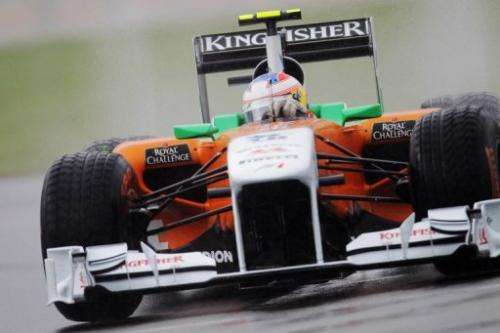F1 gearing up for new 'green' and 'cool' future

Formula One is preparing itself for a period of progressive change towards greater fuel efficiency, clearer 'green' credentials and much bigger popularity with car makers and racing fans.
This vision of a future when 'green equals cool' and accelerates the sport's brand vision towards a more eco-friendly set of values suitable for a new age of low carbon emissions was spelt out by team chiefs this week.
Mercedes' boss Ross Brawn and McLaren's Martin Whitmarsh were members of a panel that met F1 supporters at 'meet the fans' forum organised by the Formula One Teams' Organisation (FOTA) at the McLaren headquarters on Thursday.
Referring to the introduction of new 1.6-litre V6 turbo-charged engines in 2014, Brawn said: "It's not only about the fact that the new engine is going to be more efficient in itself.
"It's the message it gives -- that it's cool to have a really efficient engine and race on a lot less fuel."
For decades, Formula One has been associated with huge levels of power, high levels of noise and fears of equally high levels of pollution, mostly associated with a perceived need to give the sport's fans a deafening experience of glorious, loud and penetrative engine performance.
Now, according to the new generation of team chiefs who are leading the forward march for the sport, those days are drawing to a close. The new engines, and their associated hybrid systems, were approved by the sport's governing body, the International Motoring Federation (FIA) on Wednesday.
The 'new age of F1' will usher in a fuel efficiency improvement of at least 35 per cent, energy recovery systems, fuel restrictions, maximum revs of up to 15,000 rpm (down from 18,000) and an overall power ceiling of around 750 bhp.
"We're setting dramatic targets for reducing the amount of fuel we race with - 30 per cent, 40 per cent and even 50 per cent less than what we're racing on now, but still with the same power and the same excitement," explained Brawn.
He went on to explain that the new F1 vision was designed to chime with the efforts of modern car makers in world of climate change, diminishing oil supplies and rising fuel prices.
But this progressive thinking was not adopted easily by the sport and faced severe opposition from many stake-holders including commercial ring-master Bernie Ecclestone, who had argued that the sport needed the noise developed by engines revving to 18,000 rpm.
Brawn added: "You're not going to get manufacturers coming in with the normally aspirated V8 we have now. The new engine creates opportunity for manufacturers to come in -- and that's a vital reason why we need a new engine with a more relevant specification for the manufacturers."
Whitmarsh was asked about the sport's future with free-to-air television and said that all the teams believed in it.
"All the FOTA teams believe in free-to-air," he said. "There will be parts of the market where there will be some differentiated service offered, but F1 teams are creating brand exposure and all the names we have on our cars require us to have a large audience.
"Our current contract requires it remains on free-to-air and the teams are going to safeguard our interests and those of the fans in this regard, but it isn't as simple as we must stay free-to-air and we must stay away from pay per view.
"We have to embrace (the understanding) that media is really multi-faceted. We have to make sure there is a mass free entry to be able to see Grands Prix, but there's an awful lot of people who want a lot more information than you're going to get on free-to-air."
The future of F1's broadcasting arrangements has been under scrutiny in recent weeks following interest from Rupert Murdoch's SKY organisation and reports suggesting that, in Britain, the BBC was not prepared to continue beyond its current contract.
(c) 2011 AFP




















